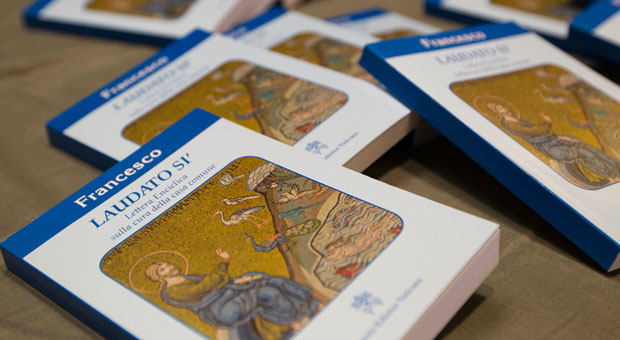Key excerpts from ‘Laudato Si’ (Praise Be) encyclical

Copies of Pope Francis’ encyclical “Laudato Si” (Praise Be) are displayed prior to the start of a press conference, at the Vatican, Thursday, June 18, 2015. Pope Francis called Thursday for a bold cultural revolution to correct what he calls the “structurally perverse” economic system of the rich exploiting the poor that is turning Earth into an “immense pile of filth.” AP PHOTO/ANDREW MEDICHINI
VATICAN CITY—Pope Francis’ newly released teaching document is a wide-ranging look at what he calls an “ecological crisis” destroying our “common home.”
The document, or encyclical, titled “Laudato Si” (Praise Be), is at once a theological treatise, a public policy analysis and a heartfelt plea for personal change.
Here are some key excerpts from the document, which was made public Thursday:
Environmental destruction
“The Earth, our home, is beginning to look more and more like an immense pile of filth.”
“These situations have caused sister Earth, along with all the abandoned of our world, to cry out, pleading that we take another course. Never have we so hurt and mistreated our common home as we have in the last 200 years.”
Global warming evidence
“A very solid scientific consensus indicates that we are presently witnessing a disturbing warming of the climatic system. In recent decades this warming has been accompanied by a constant rise in the sea level and, it would appear, by an increase of extreme weather events, even if a scientifically determinable cause cannot be assigned to each particular phenomenon. Humanity is called to recognize the need for changes of lifestyle, production and consumption, in order to combat this warming or at least the human causes which produce or aggravate it.”
Those who deny it
“As often occurs in periods of deep crisis which require bold decisions, we are tempted to think that what is happening is not entirely clear. Superficially, apart from a few obvious signs of pollution and deterioration, things do not look that serious, and the planet could continue as it is for some time. Such evasiveness serves as a license to carrying on with our present lifestyles and models of production and consumption. This is the way human beings contrive to feed their self-destructive vices: trying not to see them, trying not to acknowledge them, delaying the important decisions and pretending that nothing will happen.”
Business, environment
“We need to reject a magical conception of the market, which would suggest that problems can be solved simply by an increase in the profits of companies or individuals. Is it realistic to hope that those who are obsessed with maximizing profits will stop to reflect on the environmental damage which they will leave behind for future generations? Where profits alone count, there can be no thinking about the rhythms of nature, its phases of decay and regeneration, or the complexity of ecosystems which may be gravely upset by human intervention.”
“To ensure economic freedom from which all can effectively benefit, restraints occasionally have to be imposed on those possessing greater resources and financial power. To claim economic freedom while real conditions bar many people from actual access to it, and while possibilities for employment continue to shrink, is to practice a doublespeak which brings politics into disrepute.”
People and nature
“A sense of deep communion with the rest of nature cannot be real if our hearts lack tenderness, compassion and concern for our fellow human beings. It is clearly inconsistent to combat trafficking in endangered species while remaining completely indifferent to human trafficking, unconcerned about the poor, or undertaking to destroy another human being deemed unwanted.”
Creation as God’s love
“Our insistence that each human being is an image of God should not make us overlook the fact that each creature has its own purpose. None is superfluous. The entire material universe speaks of God’s love, His boundless affection for us. Soil, water, mountains: everything is, as it were, a caress of God.”
Rich nations’ reluctance
“Many of those who possess more resources and economic or political power seem mostly to be concerned with masking the problems or concealing their symptoms, simply making efforts to reduce some of the negative impacts of climate change. However, many of these symptoms indicate that such effects will continue to worsen if we continue with current models of production and consumption.”
Leaders’ failures
“It is remarkable how weak international political responses have been. The failure of global summits on the environment makes it plain that our politics are subject to technology and finance. There are too many special interests, and economic interests easily end up trumping the common good and manipulating information so that their own plans will not be affected.”
Redefining progress
“It is not enough to balance, in the medium term, the protection of nature with financial gain, or the preservation of the environment with progress. Halfway measures simply delay the inevitable disaster. Put simply, it is a matter of redefining our notion of progress. A technological and economic development which does not leave in its wake a better world and an integrally higher quality of life cannot be considered progress.”
Morality, common good
“We must regain the conviction that we need one another, that we have a shared responsibility for others and the world, and that being good and decent are worth it. We have had enough of immorality and the mockery of ethics, goodness, faith and honesty. It is time to acknowledge that light-hearted superficiality has done us no good. When the foundations of social life are corroded, what ensues are battles over conflicting interests, new forms of violence and brutality, and obstacles to the growth of a genuine culture of care for the environment.”
RELATED STORIES
Pope urges revolution to save Earth, fix ‘perverse’ economy
Filipino activists encouraged by Pope Francis’ message














